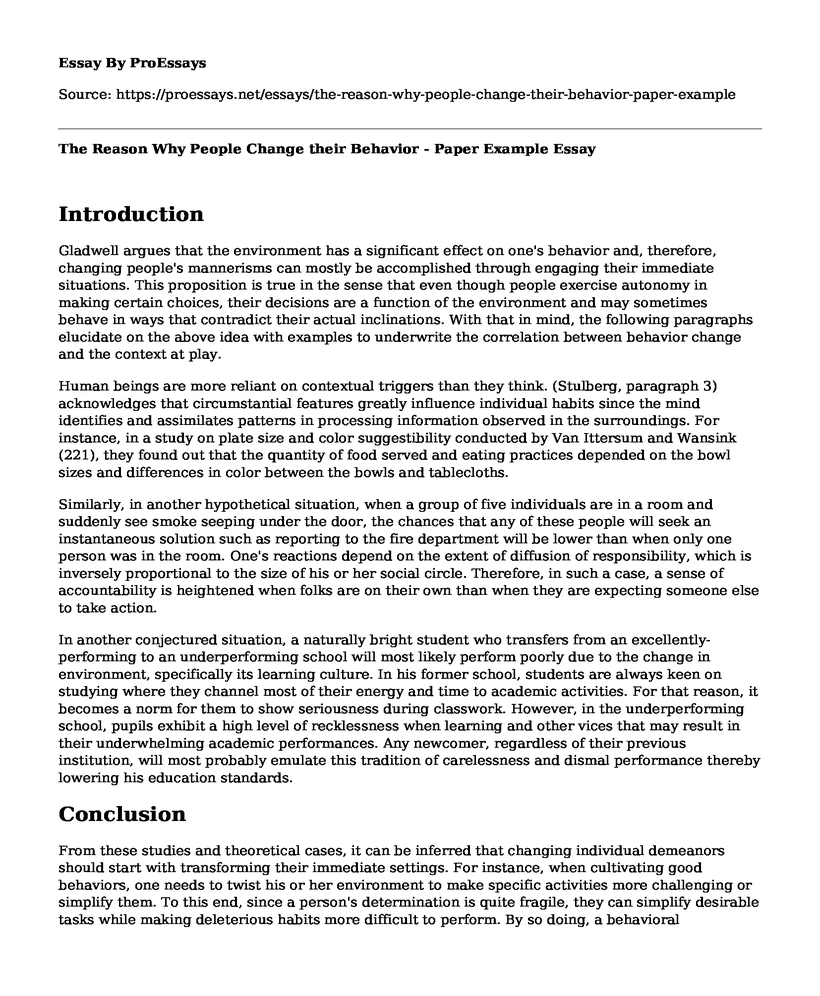Introduction
Gladwell argues that the environment has a significant effect on one's behavior and, therefore, changing people's mannerisms can mostly be accomplished through engaging their immediate situations. This proposition is true in the sense that even though people exercise autonomy in making certain choices, their decisions are a function of the environment and may sometimes behave in ways that contradict their actual inclinations. With that in mind, the following paragraphs elucidate on the above idea with examples to underwrite the correlation between behavior change and the context at play.
Human beings are more reliant on contextual triggers than they think. (Stulberg, paragraph 3) acknowledges that circumstantial features greatly influence individual habits since the mind identifies and assimilates patterns in processing information observed in the surroundings. For instance, in a study on plate size and color suggestibility conducted by Van Ittersum and Wansink (221), they found out that the quantity of food served and eating practices depended on the bowl sizes and differences in color between the bowls and tablecloths.
Similarly, in another hypothetical situation, when a group of five individuals are in a room and suddenly see smoke seeping under the door, the chances that any of these people will seek an instantaneous solution such as reporting to the fire department will be lower than when only one person was in the room. One's reactions depend on the extent of diffusion of responsibility, which is inversely proportional to the size of his or her social circle. Therefore, in such a case, a sense of accountability is heightened when folks are on their own than when they are expecting someone else to take action.
In another conjectured situation, a naturally bright student who transfers from an excellently-performing to an underperforming school will most likely perform poorly due to the change in environment, specifically its learning culture. In his former school, students are always keen on studying where they channel most of their energy and time to academic activities. For that reason, it becomes a norm for them to show seriousness during classwork. However, in the underperforming school, pupils exhibit a high level of recklessness when learning and other vices that may result in their underwhelming academic performances. Any newcomer, regardless of their previous institution, will most probably emulate this tradition of carelessness and dismal performance thereby lowering his education standards.
Conclusion
From these studies and theoretical cases, it can be inferred that changing individual demeanors should start with transforming their immediate settings. For instance, when cultivating good behaviors, one needs to twist his or her environment to make specific activities more challenging or simplify them. To this end, since a person's determination is quite fragile, they can simplify desirable tasks while making deleterious habits more difficult to perform. By so doing, a behavioral transformation will be inevitable.
Works Cited
Gladwell, Malcolm. The tipping point: How little things can make a big difference. Little, Brown, 2006.
Stulberg, Brad. "The Key To Changing Individual Health Behaviors: Change The Environments That Give Rise To Them | Harvard Public Health Review: A Student Publication". Harvardpublichealthreview.Org, 2014, http://harvardpublichealthreview.org/the-key-to-changing-individual-health-behaviors-change-the-environments-that-give-rise-to-them/. Accessed 8 May 2018.
Van Ittersum, Koert, and Brian Wansink. "Plate size and color suggestibility: the Delboeuf Illusion's bias on serving and eating behavior." Journal of Consumer Research 39.2 (2011): 215-228
Cite this page
The Reason Why People Change their Behavior - Paper Example. (2022, May 22). Retrieved from https://proessays.net/essays/the-reason-why-people-change-their-behavior-paper-example
If you are the original author of this essay and no longer wish to have it published on the ProEssays website, please click below to request its removal:
- Childhood Trauma and Criminal Behavior: An Annotated Bibliography
- Epidemic of Mental Health Issues in Youths of Affluent Families Paper Example
- Patient With Social Anxiety Disorder Case Study
- Essay Example on Train for Success: Lowering Costs & Upholding Knowledge at Bloomsdale
- Essay Sample on The Three Components of Personality: Id, Ego, Superego
- Culturally Defining Suicide: An In-Depth Look - Essay Sample
- Free Essay Sample on CBT vs Existential-Humanistic Therapy: A Comparison







